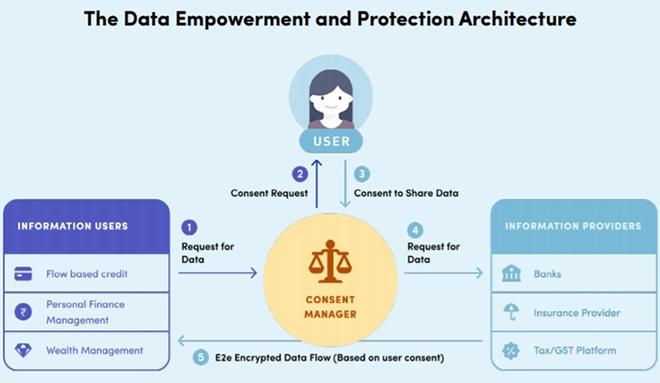Ahmedabad
(Head Office)Address : 506, 3rd EYE THREE (III), Opp. Induben Khakhrawala, Girish Cold Drink Cross Road, CG Road, Navrangpura, Ahmedabad, 380009.
Mobile : 8469231587 / 9586028957
Telephone : 079-40098991
E-mail: dics.upsc@gmail.com

Data Empowerment and Protection Architecture
News: India’s G-20 presidency has provided an opportunity for the country to ensure that its digital strategies and data governance are inclusive, transparent, secure and conducive to sustainable development.
Background:
In recent years, India has made great strides in its digital strategies/data governance by embracing technology (say, UPI) and digitalisation which has been driving force for economic growth and improving the lives of citizens.
However, the issues of ownership and governance of data generated and collected and data sovereignty have become increasingly important.
Data sovereignty is the idea that data is subject to the laws and governance structures of the nation where they are collected.
Given this, it is unreasonable to deny people control over their data and India’s DEPA a consent management tool, has generated both excitement and concern among stakeholders.
What is DEPA?
It was launched by the NITI Aayog in 2020 on the premise that individuals themselves are the best judges of the ‘right’ uses of their personal data.
It is designed as an evolvable/agile framework for good data governance that empowers people to seamlessly and securely access their data and share it with third-party institutions.
What are advantages of DEPA?
Potential to improve data protection and privacy for citizens
Allowing individuals to easily manage and control their data consent
Build trust in digital technologies and data governance.
What are its limitations?
Personal data could be misused or misappropriated if the consent management tool is not properly implemented.
An implementation may be inconsistent across different sectors and jurisdictions which undermine effectiveness, and creates confusion among citizens.
Way Forward
The DEPA must be implemented in a transparent, consistent and secure manners.
Clear, transparent and accountable data governance policies and regulations. India Data Management Office (IDMO) proposed by MeitY will frame/manage review/revise the National Data Governance Framework Policy (NDGFP).
Investment in the necessary digital infrastructure and skills. India Stack is a unified software platform that provides digital public goods, and application interfaces and facilitates digital inclusion.
Advances in financial inclusion (UPI) can be replicated successfully in other areas (health, agriculture).
International cooperation and collaboration in addressing risks posed by the rapid growth of data and digital technologies.

Address : 506, 3rd EYE THREE (III), Opp. Induben Khakhrawala, Girish Cold Drink Cross Road, CG Road, Navrangpura, Ahmedabad, 380009.
Mobile : 8469231587 / 9586028957
Telephone : 079-40098991
E-mail: dics.upsc@gmail.com
Address: A-306, The Landmark, Urjanagar-1, Opp. Spicy Street, Kudasan – Por Road, Kudasan, Gandhinagar – 382421
Mobile : 9723832444 / 9723932444
E-mail: dics.gnagar@gmail.com
Address: 2nd Floor, 9 Shivali Society, L&T Circle, opp. Ratri Bazar, Karelibaugh, Vadodara, 390018
Mobile : 9725692037 / 9725692054
E-mail: dics.vadodara@gmail.com
Address: 403, Raj Victoria, Opp. Pal Walkway, Near Galaxy Circle, Pal, Surat-394510
Mobile : 8401031583 / 8401031587
E-mail: dics.surat@gmail.com
Address: 303,305 K 158 Complex Above Magson, Sindhubhavan Road Ahmedabad-380059
Mobile : 9974751177 / 8469231587
E-mail: dicssbr@gmail.com
Address: 57/17, 2nd Floor, Old Rajinder Nagar Market, Bada Bazaar Marg, Delhi-60
Mobile : 9104830862 / 9104830865
E-mail: dics.newdelhi@gmail.com